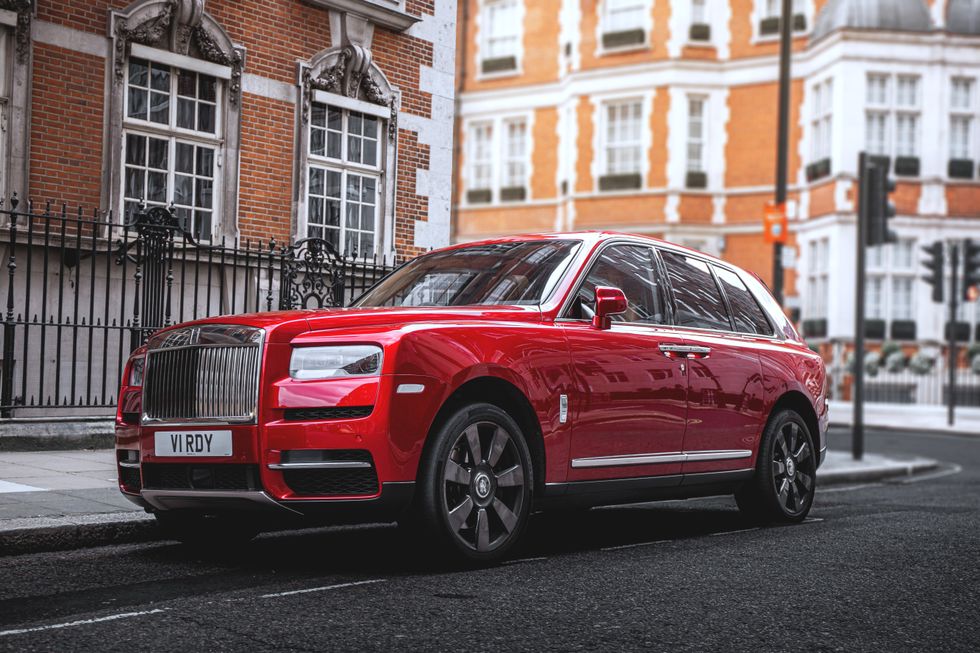Experts are warning that cars are becoming dangerously large for Britons and UK streets as research has found that vehicles are getting bigger by one centimetre every two years.
New data suggests that cars in the UK are starting to exceed the 180cm minimum width for on-street parking as drivers in Britain tend to opt for larger SUVs.
The average width of a new car in 2018 was just 177.8cm, compared to new 2023 cars which are 180.3cm wide, according to Transport and Environment (T&E).
The United Kingdom was found to have the second-widest cars on average in Europe, falling shortly behind Germany.
Do you have a story you’d like to share? Get in touch by emailing[email protected]
New data suggests cars are becoming too big for UK roads
GETTY
Regulations state that new cars in the UK must have the same maximum width as buses and trucks – 255cm, although the minimum specified on-street parking space is 180cm in major cities.
More than half of the vehicles sold in 2023 were found to be too wide for these spaces, while luxury SUVs often make it impossible to fit inside the space.
There are fears this problem could get worse over the coming years as more drivers choose to buy larger vehicles and as the UK becomes more densely populated.
The Land Rover was found to have received the largest width extension, growing by 20.6cm, followed by the Mercedes X5 by 6cm in just six years.
Richard Hebditch, UK Director for T&E UK, said: “The trend of cars getting wider has been progressing for decades and that trend will continue until the UK sets stricter limits. Currently, we allow new cars to be as wide as trucks.
“This has meant our roads are now home to big SUVs and American-style pick-up trucks that are parking on our footpaths, endangering pedestrians and cyclists and making everyone else on our roads less safe.”
Larger cities around the world are now starting to take action as Paris gears up for a referendum on whether SUV owners should pay three times more to park in a bid to cut air pollution, taking place on February 4.
Leo Murray, co-director of climate charity Possible, described the issue as “autobesity” and highlighted how new SUVs are “spilling out” of on-street parking spaces and blocking footpaths.
He added: “Previous research has found that ‘downsizing’ policies to limit the size and weight of new private cars could be surprisingly effective at driving down carbon emissions too, so we are delighted to join T&E’s call for a new width limit on UK car sales from 2030.
“In the meantime, forward-looking local authorities can help by only issuing on-street residential parking permits for cars that actually fit inside the spaces provided.”
T&E UK is calling for a mandated width limit for cars with an approval process that is consistent with European Union regulations to reduce costs for manufacturers.
The proposals state that these measures could be rolled out from January 1, 2030, which would be consistent with the changes to EU regulations proposed by T&E.
If two average 180cm wide cars are parked on either side of a road, there is enough space for another 180cm wide vehicle to be driving, as well as 130cm wide for a cyclist to ride the opposite way.
However, with the growing width of the vehicles, other road users could get even less space. If there were two parked cars and one car driving, all of which are two metres wide, it would leave just 70cm for a cyclist.
LATEST DEVELOPMENTS:

Larger vehicles are struggling to fit inside standard parking spaces
GETTY
Sarah McMonagle, director of external affairs at Cycling UK, said: “In general, people driving wider vehicles are more likely to pass people cycling more closely than those driving narrower ones.
“This is particularly the case on narrow rural lanes or on residential streets with lots of parking, where those on bikes are often bullied off the road to make way.
“We need Government action to stop motor manufacturers fuelling our addiction to ever more obese cars.
“Bigger cars are not better, they’re less sustainable, make our roads more dangerous, and take up more space, increasing congestion.”

Robert Johnson is a UK-based business writer specializing in finance and entrepreneurship. With an eye for market trends and a keen interest in the corporate world, he offers readers valuable insights into business developments.








